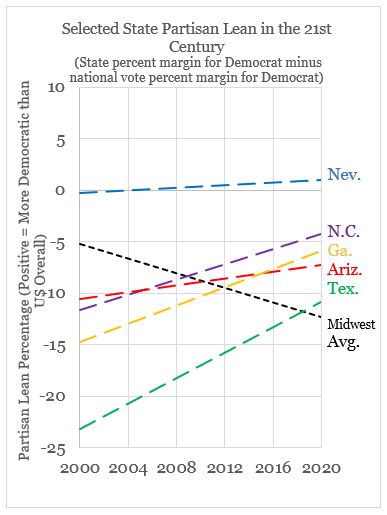
Georgia’s Raphael Warnock is the Second Most Vulnerable Incumbent This Cycle – but His Race Will Also Illuminate Democrats’ Prospects This Decade
Over these two weeks starting February 21, we are profiling the five most vulnerable incumbent senators up in 2022. We began with New Hampshire’s Maggie Hassan, Wisconsin’s Ron Johnson, and Arizona’s Mark Kelly. In this piece, the second most vulnerable: Georgia’s Raphael Warnock.
There is a compelling case to be made that Raphael Warnock is the most vulnerable senator up in 2022. He won by 2% in a special election runoff in 2021 in a state that’s about 7% more Republican than the country overall. Warnock is a compelling orator and his pet causes are uniquely fixated on voting rights and criminal justice, two existential issues of the day. But, he was up against a weak opponent last year in appointed Republican Senator Kelly Loeffler (who went out of her way to be incredibly conservative, despite Georgia’s relatively even-split electorate), and Warnock routinely (albeit narrowly) led against her in aggregate polls.
The first Black Democrat elected from a former Confederate state, Warnock is in for a tough race in 2022 as he seeks a full term. But he has three major advantages over our most vulnerable incumbent:

- Georgia is changing, fast: as we flagged in our series on the Midwest and Democrat’s increasing headwinds in that region over the last two decades, Georgia provides one of the more optimistic turnarounds for the party elsewhere. Its partisan lean has moved 10 points towards Democrats in the last 20 years, making it one of the fastest-moving swing states. This is important, because this sort of trend is often a key indicator years in advance in states like Colorado, Texas, and Virginia (moving towards Democrats), and in states like Florida, Pennsylvania, and Wisconsin (moving towards Republicans). Georgia’s trend is more aggressive than that of perennially narrow states like Nevada or North Carolina, too.
If Democrats pull out a win in the Georgia Senate election in 2022, it’s a good sign that there’s hope for the party even as they lose white voters in the Midwest. Sure, trends can certainly be overcome in a year leaning very strongly against one party, but demographic momentum is a useful underwriter to have in your corner if you’re Warnock. - Strong organization: Were it not for that violent attack on the Capitol (or “legitimate political discourse” depending on which Republican you ask) that occured the exact same day Warnock was declared the winner, Democratic organizing in Georgia would have been the biggest political story of early 2021. A stunning mobilization, organization, and voter drive – especially among Black voters – was the key to delivering a victory in Georgia for Joe Biden and the two Democratic senate candidates that gave Democrats control of a Republican-controlled Senate, and it seized on the state-level momentum and demographic trends that we unpacked above.
Running off of Democrat’s 2018 gubernatorial candidate Stacey Abrams’ playbook, Georgia organizers capitalized on anti-Trump sentiment to turn out Black voters and voters in the growing Atlanta metropolitan area. In 2004, Democrats won only three of the Atlanta metro’s ten counties. In 2020 they only lost two. If the Abrams machine continues to build momentum (by the way, she’s running for governor in 2022 too, so she’ll be on the ballot) and drive these kinds of voters towards Democrats, the race is Warnock’s to lose. Especially if he has, well… - …a weak opponent: Warnock’s almost certain challenger will be former NFL running back Herschel Walker. Walker is not only just the only primary candidate polling in double digits on the GOP side, he’s also polling ahead of the runner-up by 75%! Call it name recognition, call it the slow coalescence of prominent decision-making Republican electeds and nonelecteds around him, it is simply just what’s happening. If you’re wondering why a prominent Black Republican with strong name recognition and no bitter primary fight to settle isn’t making Warnock shake in his boots, it’s because Walker comes with a lot of baggage.
First there was the issue of Walker living in Texas instead of Georgia. Then there were his claims that he graduated from college (he hadn’t). There are also his regrettable conspiracy theories about election integrity and January 6. But the main story is the longstanding accusations against him for violent and threatening behavior. Walker has said that he suffers from dissociative identity disorder and wrote that he engaged in dangerous behavior, including thoughts of killing others. But a point that has come into particular focus has been his relationship with his ex-wife. She says that he pointed a gun at her head and threatened to kill her. She secured a protective order against him. Her sister corroborates that Walker called members of their family and said he’d kill his ex and her boyfriend. There are some pretty dark moments described in regards to his life and to his relationship with his ex-wife, which will get a lot more attention as this race barrels towards the general election.
Warnock is a very strong candidate with a strong organization, strong backing, and the state’s demography blowing at his back – but Georgia is still a Republican-leaning state. That makes this race a fair toss-up.